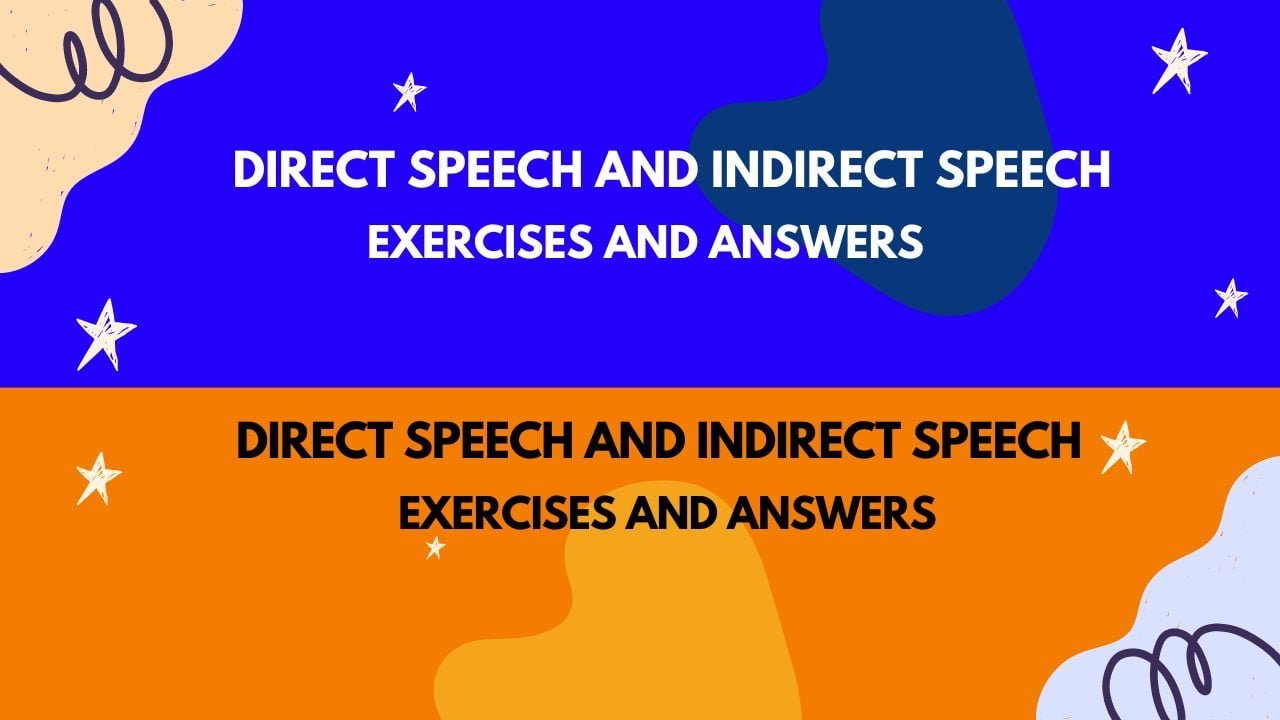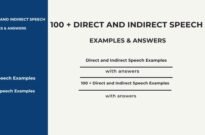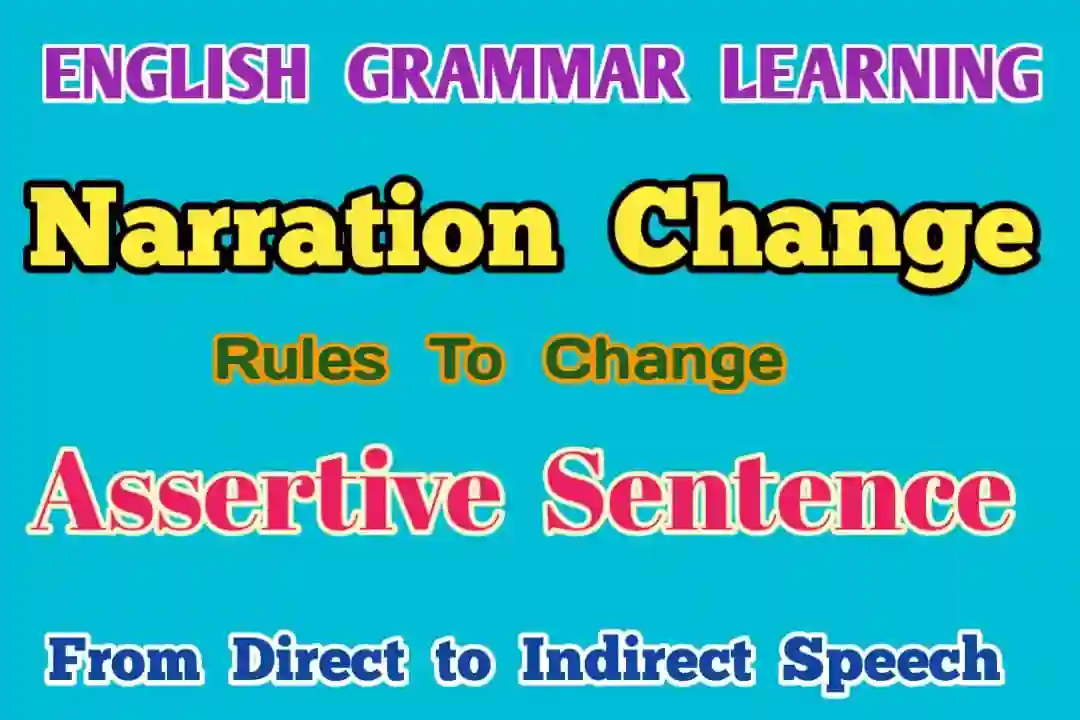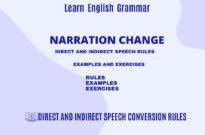Direct and indirect speech exercises and answers (2025) help learners understand the transformation between direct statements and reported speech, enhancing their comprehension and expression abilities.
We frequently employ direct and indirect speech in our everyday interactions to accurately convey what was said and summarize information efficiently.
Enhance your understanding of Direct and Indirect Speech with our extensive collection of over 200 exercises and corresponding answers.
Through practice in transforming quotations into reported speech, grasp the principles and methods involved, and refine your differentiation between direct and indirect speech.
Elevate your language proficiency and deepen your comprehension of English with our comprehensive set of over 200 Direct and Indirect Speech exercises and answers.
Understanding Direct Speech
Direct speech is when the exact words spoken by a person are quoted within quotation marks. It provides a direct representation of what was said, maintaining the original wording and tone. Direct speech adds authenticity and immediacy to the narrative.
For example,
- Direct Speech: My aunt said, ‘Every mother loves her child.’
- Direct Speech: Mon said to me, ‘I shall go, but you will stay.’
Explore Indirect Speech
Indirect speech, also known as reported speech, conveys someone else’s words without quoting them directly. Indirect speech offers a concise summary, enabling effective communication and storytelling.
For example,
- Indirect Speech: My aunt said that every mother loves her child.
- Indirect Speech: Mon told me that she would go but I should stay.
Before delving into the direct and indirect speech exercises, consider how Tense, Pronouns, Time, and Place change when transitioning from direct to indirect speech and vice versa.
Exercises and Answers for Direct and Indirect Speech (2025)
Direct and Indirect Speech Exercises and answers, along with examples are given in the following for practice. It’s important for students as well as for competitive Exams. For practice and easy comprehension, Direct and indirect speech Exercises and answers have been arranged according to different rules in the following.
Direct and Indirect Speech Exercises and Answers with Tense Transformations
Exercises and answers with tense alterations facilitate practice and comprehension of verb tense transformations.
Exercise 1:
Change the mode of narration from direct Speech to indirect speech.
(1) He said, ‘I need some money.’
Ans: He said that he needed some money.
(2) She said, ‘I am waiting for him.’
Ans: She said that she was waiting for him.
(3) The boy said, ‘I have done my homework.’
Ans: The boy said that he had done his homework.
(4) You said, ‘The baby has been sleeping.”
Ans: You said that the baby had been sleeping.
(5) You say, ‘I am always busy.’
Ans: You say that you are always busy.
(6) The child will say, ‘Mum knows everything.’
Ans: The child will say that Mum knows everything.
(7) He said, ‘I did it.’
Ans: He said that he had done it.
(8) She said, ‘He was talking.’
Ans: She said that he had been talking.
(9) The monk said, ‘Man will die.’
Ans: The monk said that man will die.
(10) He said, ‘The sun gives us light.’
Ans: He said that the sun gives us light.
Exercise 2:
Switch the narrative style from direct speech to indirect speech.
(1) He said to me, “I can’t recall your name.”
Ans: He told me that he could not recall my name.
(2) Poulami says, “I am fine.”
Ans: Poulomi says that she is fine.
(3) He said, “I did it.”
Ans: He said that he had done it.
(4) “I know her address,” said Gopi.
Ans: Gopi said that he knew her address.
(5) Ram said, “The earth is round.”
Ans: Ram said that the Earth is round.
(6) “We planted it ourselves,” said the grandfather.
Ans: The Gran Father said that they had planted it themselves.
(7) Debu said, “I have been playing rugby.”
Ans: Debu said that he had been playing rugby.
(8) Purbasha said to me,” I am afraid of ghosts.”
Ans: Purbasha told me that she was afraid of ghosts.
People Also Ask
Exercise 3:
Turn the following sentences from direct Speech to indirect speech.
(1) The boys said, “It has been raining since morning. We cannot play today.”
Ans: The boys said that it had been raining since morning so they could not play that day.
(2) Anjan’s mother said, “Your father has left for Mumbai.”
Ans: Anjan’s mother said that my father had left for Mumbai.
(3) My teacher said, “Practice makes a man perfect.”
Ans: My teacher said that practice makes a man perfect.
(4) He says, “I go to the temple every morning.”
Ans: He says that he goes to the temple every morning.
(5) He said to me, “I will not get down from the bus.”
Ans: He told me that he would not get off the bus.
(6) Rita says to Mita, “I will go with you.”
Ans: Rita tells Mita that she will go with her.
(7) The boy said to his friend, “I went to school yesterday.”
Ans: The boy told his friend that he had gone to school the previous day.
(8) You said, “I was right.”
Ans: You said that you had been right.
(9) “I‘ll go to the top,” said the young lady.
Ans: The young lady said that she would go to the top.
(10) I‘ve got my rules,” the conductor said to me.
Ans: The conductor told me that he had got his rules.
Pronouns in Direct and Indirect Speech: Exercises and Answers
Exercises and answers incorporating pronouns in direct and indirect speech facilitate learners’ understanding and application of pronoun changes in reported speech structures.
Exercise 4:
Change the mode of narration from direct Speech to indirect speech.
(1) You said, ‘I never smoked.”
Ans: You said that you never smoked.
(2) I said, ‘I am always busy.”
Ans: I said that I was alway busy
(3) I said to you, ‘You look tired.”
Ans: I said to you that you looked tired.
(4) You said to me, ‘You are dependable.”
Ans: You said to me that I was dependable.
(5) You said, “He is right.”
Ans: You said that he was right.
(6) I said, “They will be late.
Ans: I said that they would be late.
(7) He said to (Deep), ‘You told it so.”
Ans: He said to Deep that he (Deep) had told it so.
(8) Mon said to Moon, “You are naughty.”
Ans: Mon said to Moon that she (Moon) was naughty.
Exercise 5:
Alter the narrative style from direct speech to indirect speech.
(1) He said to me, “I have done the job.”
Ans: He told me that he had done the job.
(2) Rohit said, “I was absent yesterday.”
Ans: Rohit said that he (Rohit) had been absent the previous day.
(3) The boy said, “My father died two years ago.”
Ans: The boy said that his father had died two years before.
(4) He said, “My goal is to climb Mt Everest.“
Ans: He said that his goal was to climb Mount Everest.
(5) “I shall certainly do nothing of this kind”, the woman.
Ans: The woman said that she would certainly do nothing of that kind.
(6) The man said, “I am exhausted.”
Ans: The man said that he was exhausted.
(7) He said, “I am washing my hands.”
Ans: He said that he was washing his hands.
(8) Mother bird said to her little ones, “Today I will teach you how to fly.”
Ans: Mother bird told her little ones that that day, she would teach them how to fly.
(9) Rita’s father says. “I have done this for you.
Ans: Rita’s father says that he had done that for her.
(10) Sumana said to her sister, “I want to play with you.”
Ans: Sumana told her sister that she wanted to play with her.
Time and Place Expressions in Direct and Indirect Speech: Exercises and Answers
Exercises and answers on time and place expressions in direct and indirect speech aid learners in accurately conveying temporal and spatial information while mastering reported speech conventions.
Exercise 6:
Turn the following direct speech into indirect speech
(1) I said to you, “I wish to start business next year.“
Ans: I said to you that I wished to start business the following years.
(2) You said to them, “Now I shall tell you a nice story.”
Ans: You told them that then you would tell them a nice story.
(3) She said to him, “I bought the book yesterday.“
Ans: She told him that she had bought the book the previous day.
(4) He said to me, “I saw your sister two years ago.
Ans: He told me that he had seen my sister two years before.
(5) He said to his son, “You may come with me tomorrow.
Ans: He told his son that he (his son) might go with him the next day.
(6) He said to her, I’m talking to you now for your good.”
Ans: He told her that he was talking to her then for her good.
(7) The girl said to me, My father died two years ago.“
Ans: The girl told me that her father died two years before.
Exception: But if ‘now‘, ‘here‘, ‘this‘ refer to things present before the speaker at the time of reporting, no change is needed.
(8) He said to me, ‘I have no friend here.‘
Ans: He told me that he had no friend here.
(9) I said, ‘We cannot be happy in this world.’
Ans: I said that we cannot be happy in this world.
(10) She said, “This is the house where I was born.”
Ans: She said that this was the house where she was born.
Exercise 7:
Change the following sentences into indirect speech.
(1) The boy said to his father, “I had my tiffin in school yesterday.“
Ans: The boy told his father that he had had his tiffin in school the previous day.
(2) The captain informed, “The tournament was postponed last year.“
Ans: The captain informed us that the tournament was postponed the previous year.
(3) She said, “We have been living here for two years.”
Ans: She said that they had been living there for two years.
(4) Arnab said to Ajit,” I am happy today.”
Ans: Arna told Ajit that he was happy that day.
(5) My friend said to me, “We went to the zoo yesterday.“
Ans: My friend told me that they had gone to the zoo the previous day.
(6) The clerk said, “I’ll do the work now.“
Ans: Clark said that he would do the work then.
(7) Hiten said to Mihir, “I received this letter yesterday.“
Ans: Hiten told me that he had received that letter the previous day.
(8) Rajib said to me. “I shall go to the picture today.“
Ans: Rajiv told me that he would go to the picture that day.
(9) He said, “We are very happy here.“
Ans: He said that they were very happy there.
(10) The farmer said, “I’ll sow the seeds now.“
Ans: The farmer said that he will show the seats then.
(12) The man said to me, “I received your gift yesterday.“
Ans: The man told me that he had received my gift the previous day.
(15) I said to my friend, “You were present in the class yesterday.“
Ans: I told my friend that he had been present in the class the previous day.
Direct and Indirect Speech Exercises and Answers of Assertive Sentences
Direct and indirect speech exercises and answers focusing on assertive sentences enable learners to grasp the nuances of reporting statements confidently and accurately.
Exercise 8:
Transform the following direct speech into indirect speech
(1) My aunt said, ‘Every mother loves her child.’
Ans: My aunt said that every mother loves her child.
(2) Mon said to me, ‘I shall go, but you will stay.’
Ans: Mon told me that she would go but I should stay.
(3) He said to his father, ‘I shall always carry out your order.’
Ans: He told his father that he would always carry out his order.
(4) She said, ‘I sang a song at today’s function.’
Ans: She said that she had sung a song at today’s function.
(5) He said to me, ‘You are wicked, so I shall not mix with you.’
Ans: He told me that I was wicked, so he would not mix with me.
Exercise 9:
Change the following sentences converting the direct speeches into indirect speeches.
(1) The teacher said to the boy, “You have forgotten the lesson.”
Ans: The teacher told the boy that he had forgotten the lesson.
(2) The boy said, “I shall go out and play.”
Ans: The boy said that he would go out and play.
(3) He said, “I am happy to be here today.”
Ans: He said that he was happy to be there that day.
(4) They said, “We shall play the game again tomorrow.”
Ans: They said that they would play the game again the next day.
(5) The boy said, “Two and two make four.”
Ans: The boy said that two and two make four.
Exercise 10:
Change the form of narration from indirect speech into direct speech.
(1) She told them that she had lost her books and theirs too.
Ans: “I have lost my books and yours too”, she told them.
(2) The princess says that she has lost her way.
Ans: The princess says, “I have lost my way.”
(3) They say that they must keep their locality clean.
Ans: They say, “We must keep our locality clean.”
(4) The girl says that those books are theirs, but that one is hers.
Ans: The girl says, “These books are theirs, but this one is mine.”
(5) The Happy prince said that he had led the dance in the Great Hall.
Ans: The Happy Prince said, “I led the dance in the great hall.”
Interrogative Sentences Direct and Indirect Speech Exercises and Answers
Engage with interrogative sentences through direct and indirect speech exercises and answers to sharpen your ability to convey questions effectively within different narrative frameworks.
Exercise 11:
(1) Mother said to her, ‘Are you feeling feverish?’
Ans: Mother inquired of her if she was feeling feverish.
(2) ‘Was it not a piece of luck?’ said Slavator.
Ans: Salvtor wanted to know if that was not a piece of luck.
(3) The host said to me, ‘Have all the guests arrived?’
Ans: The host asked me whether all the guests had arrived.
(4) I said, ‘Do you know who will preside over the meeting?’
Ans: I asked whether he knew who would be presiding over the meeting.
(5) I said to the boy, ‘Did you pass the examination?’
Ans: I asked the boy if had passed the examination.
(6) She said to him, ‘Which of the books do you want to buy?
Ans: She asked him which of the books he wanted to buy.
(7) The king said, ‘Who is not ready to due for his land, my countryman?’
Ans: The king asked his countrymen who was not ready to due for his
land.
(8) He said to her, ‘Whose type writer are you using?
Ans: He inquired of her whose type- writer she was using.
(9) The girl said to the strang ‘Whom do you want to see?
Ans: The girl asked the stranger whom he wanted to see.
(10) The teacher said to the student, ‘Why are you late regularly?
Ans: The teacher asked the student why he was late regularly.
Exercise 12:
Turn the following sentences from direct speech to indirect speech.
(1) Bulbuli said to her friend, “Will you come tomorrow?”
Ans: Bulbuli asked her friend if she would on the next day.
(2) The policeman said to the stranger, “What are you looking for?”
Ans: The police asked the stranger what he was looking for.
(3) Nikhil said to me, “Why do you look sad?
Ans: Nikhil asked me why I looked sad.
(4) I said to her, “Did you take tea ?”
Ans: I asked her if she had taken tea.
(5) The girl said to her mother, “Will you give me your bangles ?”
Ans: The girl asked her mother if she would give her her bangles.
(6) Father said to me, “Why are you so upset?”
Ans: Father asked me why I was so upset.
Exercise 13:
Change the following indirect speech into Direct speech.
(1) She asked me if I had called her.
Ans: She said to me, “Did you call me ?”
(2) He asked me if I was writing a letter.
Ans: He asked me, “Are you writing a letter ?”
(3) The man asked the child how he had got there.
Ans: “How did you get here, child ?”, the man said.
(4) The police asked me if I could show my identity card.
Ans: The police said to me, “Can you show your identity card ?”
(5) He asked us if we were attending the meeting that day.
Ans: He said to us, “Are you attending the meeting today?”
(6) I asked her if she had taken medicine.
Ans: I said to her, “Did you take medicine ?”
(7) Raja asked Dipu if he would go to school that day.
Ans: Raja said to Dipu, “Will you go to school today?
Imperative Sentences Direct and Indirect Speech Exercises and Answers
Master imperative sentences through direct and indirect speech exercises and answers, refining your skill in conveying commands and requests within diverse linguistic contexts.
Exercise 14:
Change the following sentences from direct speech to indirect speech.
(1) The teacher said, ‘Boys, go to your classes.’
Ans: The teacher ordered the boys to go to their classes.
(2) She said to him, ‘Please lend me your pen.’
Ans: She requested him to lend her his pen.
(3) The mother said to her son, ‘Wait here for me.’
Ans: The mother told her son to wait there for her.
(4) He said to me, ‘Go home at once.’
Ans: He advised me to go home at once.
(5) I said to my teacher, ‘Please explain the passage.
Ans: I requested my teacher to explain the passage.
(6) The student said to the teacher, “Excuse me, sir.’
Ans: The student begged the teacher to excuse him.
(7) He said, ‘Friends, lend me your ears.
Ans: Addressing them as friends, he requested them to lend him their ears.
Exercise 15:
Change the following sentences from direct speech to indirect speech.
(1) The teacher said to the students, “Keep quiet.”
Ans: The teachers ordered the students to keep quiet.
(2) My teacher said to me. “Do not neglect your studies.”
Ans: My teacher advised me not to neglect my studies.
(3) The man said to his son, “Always try to be honest.”
Ans: The man advised it’s on to always try to be honest.
(4) Mother said to Raju, “Do not run in the sun.”
Ans: Mother ordered Raju not to run in the sun.
(5)The man said to me, “Brother, please help me.”
Ans: Addressing as a brother, the man requested me to help him.
(6)The students said, “Please allow us to play in the field.”
Ans: The students requested to allow them to play on the field.
(7) He said to me, “Please give me some money.”
Ans: He requested me to give him some money.
Exercise 16:
Change the following sentences from Indirect speech to Direct Speech of narration.
(1) He advised me not to waste my valuable time.
Ans: He said to me, “Don’t waste your valuable time.”
(2) The grandson advised the children not to pluck flowers.
Ans: The gardener said to the children, “Do not pluck flowers.”
(3) Tom forbade Sid to shake him.
Ans: Tom said to Sid, “Don’t shake me.”
(4) The master ordered the servant to sort the door.
Ans: The master said to the servant, “Shut the door.”
(5) The commander ordered the soldiers to stand at ease.
Ans: The commander said to the soldiers, “Stand at ease.”
(6) Addressing as sethji, the vendor told him not to rob the poor.
Ans: “Sethji, don’t rob the poor”, said the vendor.
(7) The doctor advised the patient to take proper vitamins to stay healthy.
Ans: The doctor said to the patient, “Take proper vitamins to stay healthy.”
(8) The teacher ordered the students to do it then.
Ans: The teacher said to the students, “Do it now.”
Direct and indirect speech Exercises and Answers with “Let”
Enhance your understanding of direct and indirect speech through exercises and answers featuring the usage of “let,” allowing you to effectively report permissions, suggestions, or proposals in various contexts
Exercise 17:
Change the following sentences from direct speech to indirect speech mode of narration.
(1) He said to her, ‘Let us go out for a walk,’
Ans: He proposed to her that they should go out for a walk.
(2) Mon said to Mohan, ‘Let us dis- cuss the matter,’
Ans: Mon suggested to Mohan that they should discuss the matter.
(3) The chairman said, ‘Let us put the motion to vote.
Ans: The chairman proposed that they should put the motion to vote.
(4) I said to her, ‘Let us have some music,’
Ans: I proposed to her that we should have some music.
(5) ‘Let us hurry or we may miss the bus,’ said he,
Ans: He urged all to hurry or they might miss the bus.
(6) She said, ‘Let me come in.’
Ans: She requested that she might be allowed to come in.
(7) He said, ‘Let her say whatever she likes.’
Ans: He said that she might say whatever she liked.
(8) He said, ‘Let me have a cup of coffee.’
Ans: He wished that he might have a cup of coffee.
(9) The player said to the captain, ‘Let me have a chance, please.’
Ans: The player requested the captain to let him have a chance.
(10) I said, ‘Let him work ever so hard, he cannot win the prize.’
Ans: He said that the visitor might be allowed to wait outside.
Exercise 18:
Change the following sentences from direct speech to indirect speech mode of narration.
(1) Rahim said, “Let us decide the matter together.”
Ans: Rahim suggested that they should decide the matter together.
(2) The boy said to me, “Let us play cricket.”
Ans: The boy proposed that they should play cricket.
(3) He said, “Let me go home.”
Ans: He wished that he might go home.
(4) He said to me, “Let him say whatever he likes.”
Ans: He wished me that he might say whatever he liked.
(5) He shouted, “Let me go out.
Ans: He shouted at me to go out.
Follow the rules to change sentence with 'Let'
Exercise 19:
Change the following sentences from indirect speech to direct speech mode of narration.
(1) She proposed that they should go to the cinema.
Ans: She said, “Let us go to the cinema.”
(2) He suggested that they should drop the matter.
Ans: He said, “Let us drop the matter”
(3) They suggested that they should make him give them their fears back.
Ans: “Let’s make him give us our fares back,” they said.
(4) Shabnam proposed Chandni that they should go for a walk.
Ans: “Let us go for a walk.” said Shabnam to Chandni.
(5) The leader suggested that they should hold a meeting the next day.
Ans: The leader said, “Let’s hold a meeting tomorrow.”
Direct and Indirect Speech Exercises and Answers of Optative Sentences
Practice direct and indirect speech with exercises and answers focusing on optative sentences, enabling you to accurately report wishes, prayers, or blessings while honing your linguistic proficiency.
Exercise 20:
Change the following from Direct Speech to Indirect Speech.
(1) Mother said, ‘May you be happy.’
Ans: Mother wished that I might be happy.
(2) He said to you, ‘May God bless you.’
Ans: He prayed that God might bless you.
(3) She said, ‘Had I been there!’
Ans: She wished that she had been there.
(4) He said to me, ‘May you succeed.’
Ans: He wished that I might succeed.
(5) They said, ‘Long live the leader.’
Ans: They prayed that the leader might live long.
(6) He said to me, ‘May your mother recover soon.
Ans: He wished that my mother might recover soon.
(7) The monk said, ‘May peace prevail.’
Ans: The monk hoped that peace would prevail.
(8) The boy siad, ‘Had I the wings of a bird.’
Ans: The boy wished that he could have the wings of a bird.
Exercise 21:
Change the following from Direct Speech to Indirect Speech.
(1) I said to him, “May you be happy.”
Ans: I wished that he might be happy.
(2) Mother said to me, “May God bless you.”
Ans: Mother prayed that God might bless me.
(3) He said, “May his soul rest in peace.”
Ans: He prayed that his soul might rest in peace.
(4)The girl said, “Oh, had I the wings of a dove.”
Ans: The girl wished that she could have the wings of a dove.
(5) I said to him, “May you live long.”
Ans: I wished him that he might live long.
Exercise 22:
Change the following from Indirect Speech to Direct Speech.
(1) Nilima wished me that I might recover soon.
Ans: Nilima said to me, “May you recover soon.”
(2) Mother wished him that God might grant him a long life.
Ans: Mother said to him, “May God grant you a long life.”
(3) The holy man wished that peace might prevail.
Ans: The holy man said, “May peace prevail.”
(4) She wished that Mother Teresa might recover from illness soon.
Ans: She said, “May Mother Teresa recover from illness soon.”
(5) He wished that he could bring his departed friend back to life.
Ans: He said, “Oh, if I could bring my departed friend back to life.”
Follow the rules to change optative sentences
Direct and Indirect Speech Exercises of Exclamatory Sentences
Engage in direct and indirect speech exercises focusing on exclamatory sentences to refine your ability in reporting strong emotions or exclamations accurately within different narrative frameworks.
Exercise 23:
Change the following from Direct Speech to Indirect Speech.
(1) The supporters said, ‘Hurrah! we have won?’
Ans: The supporter exclaimed in joy that they had won.
(2) The girl said, ‘How wonderful love is!’
Ans: The girl exclaimed in joy that love is wonderful.
(3) The teacher said, ‘Bravo! Well done!’
Ans: The teacher applauded his students by saying that they had done well.
(4) ‘Alas! I am undone’, said the women.
Ans: They women cried out in sorrow that she was undone.
(5) He said, ‘Good bye, my friends !’
Ans: He bade his friends good bye.
(6) The old man said to the youth, ‘Fie! You are such a coward.’
Ans: The old man exclaimed that it was shameful for the youth to be such a coward.
(7) ‘How dirty the house is!’ he observed.
Ans: He exclaimed in irritation that the house was very dirty.
(8) ‘Good God! I am saved’, said he.
Ans: He exclaimed in the name of merciful God that he was saved.
Exercise 24:
Change the following from Direct Speech to Indirect Speech.
(1) The boys triumphantly said, “Hurrah! We have won the match.”
Ans: The boys exclaimed in joy that they had won the match.
(2) The old man said to the girl, “May you be happy !”
Ans: The old man wished the girl that she might be happy.
(3) He said, “What good news!”
Ans: He exclaimed in joy that it was very good news.
(4)The children said, “How happy we were there!”
Ans: The children gloomily said that they had been very happy there.
(5) He said to you. “May God bless you.”
Ans: He wished you that God might bless you.
(6) My friend said to me. “What a fool you are!”
Ans: My friend exclaimed in despair that she was a big fool.
Exercise 25:
Change the following from Indirect Speech to Direct Speech.
(1) Piyali exclaimed in sorrow that she had lost her phone.
Ans: “Alas! I have lost my phone”, said Piyali.
(2) Mother wished Roy that his dreams might come true.
Ans: Mother said to Roy, “May your dreams come true.”
(3) The girl exclaimed that she had been very sensible.
Ans: How insensible I have been!”, said the girl.
(4) The girl exclaimed in sorrow that she had torn her frock.
Ans: The girl said, “Oh dear! I have torn my frock.”
(5) She exclaimed in sorrow that she was undone.
Ans: She said, “Alas! I am undone.”
(6) They wished me happy birthday.
Ans: They said to me. “Happy birthday!”
(7) The students bade their teacher good morning.
Ans: “Good morning, Madam!”, said the students to the teacher.
Practice Worksheet for Direct and Indirect Speech Exercises
A . Change the following into reported speech.
1. Rita says, “Kishore sang a song”.
2. The saint said, “Man is mortal”
3. You said, “we are learning our lesson’.
4. He said to me, “My father went to Mumbai last week.
5. I said to her, “Are you leaving tonight?”
6. He said to her, “Can you lend me your umbrella?”
7. She said, “I saw a tiger here’.
8. The principal said, “well done! my boys”.
9. She said, “Let them play.”
10. I said to Harsh, “Please help me.”
B. Change the direct speech into Indirect Speech
1. He asked me, “Where has he gone?”
2. The Prime Minister said, “National Integrity will be preserved at all costs.
3. She said, “My uncle came yesterday.”
4. Sheela said to us, “You must work hard.”
5. They said, “We trust in God.”
6. The officer said to him. “You will be dismissed if you do not attend the office in time.'”
7. He said to me “I am reading a book.”
8. He said, “Thanks for reminding me.’
9. She said,” Keep this room open.’
10. I said to him, “I went there on Tuesday.”
C. Choose the correct option.
1. I advised him ____________ it.
(a) to not do
(b) not to do
(c) not do
2. She told me ____________ careful.
(a) be
(b) to be
(c) that be
3. She asked me if I ____________ my lunch.
(a) ate
(b) have eaten
(c) had eaten
4. She asked me ____________ going to the movies
(a) that I was
(b) if was I
(c) if I was
5. The dentist suggested ____________ get a new toothbrush.
(a) me to
(b) that I should
(c) me that I should
6. She said that no one ____________ me
(a) called
(b) have
(c) had called
7. He asked me ____________ to deserve such a cruel punishment.
(a) what had he done
(b) what he had done
(c) that he had done
8. He promised he ____________ do it by the end of the week.
(a) will
(b) would
(c) should
9. She said that ____________ me before.
(a) she hadn’t met
(b) she did not meet
(c) she will not meet
10. I requested her____________ me.
(a) help
(b) to help
(c) that help
D. Complete the sentences in the reported speech.
1. The girl said that it ___________ to be there that evening.
(a) gave her great pleasure
(b) gives her great pleasure
(c) gives her great pleasure
2. The man said that he ___________ as soon as possible.
(a) must go
(b) had gone
(c) should be gone
3. She said that she ___________ to se any of them.
(a) does not want
(b) did not want
(c) had not wanted
4. The teacher says that if you work hard you ___________
(a) would pass
(b) will pass
(c) pass
5. He said that he ___________
(a) won
(b) has won
(c) had won
6. He proposed that they ___________ for her return.
(a) shall wait
(b) will wait
(c) should wait
7. Alice exclaimed how clever ___________
(a) she was
(b) was she
(c) she has been
8. The young man asked which way she ___________
(a) has gone
(b) had gone
(c) would go.
9. He asked me where ___________ going.
(a) I was
(b) was I
(c) I am
10. She requested them to wait there till she ___________
(a) returns
(b) returned
(c) will return
E. Complete the sentence in the reported speech.
1. Ravi said, “I love this place”.
Ravi said _______________
2. “Do you like football?” He asked me.
He asked me_______________
3. “I can’t drive a lorry”, he said.
He said _______________
4. “Be nice to your brother”, he said
He asked me _______________
5. “Don’t be nasty, “he said
He urged me _______________
6. “Don’t waste your money “she said,
She told the boys _______________
7. “What have you decided to do? “she asked
him. She asked him _______________
8. “I always wake up early”. he said,
He said_______________
9. “You should revise your lessons’, he said,
He advised the students _______________
10. “Where have you been? “he asked me
He wanted to know _______________
F. Complete the sentence in the reported speech.
1. She said, “I went to cinema yesterday,”
She said _______________
2. You said, “I will do this for him.”
You said _______________
3. He said, “I am writing a test tomorrow,
He said _______________
4. She said, “I am not hungry now”,
She said _______________
5. They said, “We have never been here before.”
They said _______________
6. They said, “We were in London last week.”
They said _______________
7. He said, “They won’t sleep.”
He said _______________
8. “Have you been shopping?” he asked us.
He wanted to know _______________
9. She said, “It is very quiet here.
She said _______________
10. “I don’t speak Italian”, she said.
She said_______________
G. Read the dialogue and complete the following passage.
Susan: Why have you not brought my party dress?
Jenny: I haven’t brought it because I had gone to my uncle’s house with my parents, so I forgot to keep it.
Susan: Don’t give me silly excuses. I want to know the truth.
Jenny: I am sorry Susan. I was chatting with my friends till late. I forgot that you needed it urgently today.
Susan asked Jenny (a) …………… Jenny said that she (b) …………… . Susan (c) …………… . Jenny said that she was sorry and further added that she was chatting with her friends till late and she had forgotten that Jenny needed it urgently that day.
H. Read the following conversation and complete the passage that follows.
Dilip: I’ve been watching the sea and there hasn’t been any trace of a ship.
Ralph: I told you yesterday too that we’ll be rescued, so have patience.
Dilip: Why do you ask me to keep quiet whenever I say something?
Ralph: Have you ever said anything sensible?
Dilip said (a) ………… . Ralph replied (b) ………… and so asked him to have patience. Dilip angrily asked Ralph (c) ………… to which Ralph wanted to know (d) …………
Direct and Indirect Speech Answers Key
A . Change the following into reported speech.
1. Rita says that Kishore sang a song.
2. The saint said that the man is mortal.
3. You said that you were learning your lesson.
4. He hold me that his father had gone to Mumbai the previous week.
5. I asked her if she was leaving that night.
6. He asked her if she could lend him her umbrella.
7. She said that she had seen a tiger there.
8. The principal exclaimed with applause that the boys had done well.
9. She suggested that they should be allowed to play.
10. I requested Harsh to help me.
B. Change the direct speech into Indirect Speech
1. He asked me where he had gone.
2. The Prime Minister declared that the National Integrity would be preserved at all costs.
3. She said that her uncle had come the previous day.
4. Sheela told us that we must work hard.
5. They said that they trusted in God.
6. The officer warned him that he would be dismissed
if he did not attend the office in time.
7. He told me that he was reading a book.
8. He thanked me for reminding him.
9. She ordered to keep that room open.
10. I told him that I had gone there on Tuesday.
C. Choose the correct option.
1. (b) not to do
2. (b) to be
3. (c) had eaten
4. (c) if I was
5. (b) that I should
6. (c) had called
7. (b) what he had done
8. (b) would
9. (a) she hadn’t met
10. (b) to help
D. Complete the sentences in reported speech.
1. (a) gave her great pleasure.
2. (a) must go
3. (b) did not want
4. (b) will pass
5. (c) had won
6. (c) should wait
7. (a) she was
8. (b) had gone
9. (a) I was
10. (b) returned
E. Complete the sentence in reported speech.
1. that he loved that place
2. whether I liked football
3. that he couldn’t drive a lorry
4. to be nice to my brother
5. not to be nasty
6. not to waste their money
7. what he had decided to do
8. that he always wake up early
9. to revise their lessons
10. where I had been
F. Complete the sentence in reported speech.
1. that she had gone to cinema the previous day.
2. that you would do that for him.
3. that he will be writing a test the next day.
4. that she was not hungry then.
5. that they had never been there before.
6. that they had been in London the previous week.
7. that they wouldn’t sleep.
8. whether we had been shopping.
9. that it was very quiet there.
10. that she didn’t speak Italian.
G. Read the dialogue and complete the following passage
(a) why she had not brought her party dress
(b) hadn’t brought it as she had gone to her uncle’s house with her parents; so she had forgotten to keep it
(c) told her not to give silly excuses and further said that she wanted to know the truth.
H. Read the following conversation and complete the passage that follows.
(a) that he had been watching the sea and that there had not been any trace of a ship
(b) that he had told him the day before that they would be rescued
(c) why he asked him to keep quiet whenever he said something
(d) if he had ever said anything sensible
FAQs on Direct and Indirect Speech Exercises and Answers
Q: What’s the purpose of the indirect speech?
A: Indirect speech allows us to convey someone else’s words without quoting them verbatim. It’s useful for summarizing and paraphrasing.
Q: Are tense changes mandatory in indirect speech?
A: Yes, tense changes are often necessary to accurately reflect the timing of the original statement.
Q: Can reporting verbs be used interchangeably?
A: While reporting verbs can be interchangeable to some extent, their nuances can impact the meaning of the reported speech.
Q: Is it possible to transform any direct speech into indirect speech?
A: Yes, most direct speech can be converted into indirect speech, although some cases may require adjustments.
Q: How can I identify indirect speech in a sentence?
A: Look for keywords like “said,” “asked,” or other reporting verbs, as well as changes in pronouns, tenses, and time expressions.
Q: Why is mastering direct and indirect speech important?
A: Mastering these skills enhances communication clarity, adds variety to language use, and fosters effective expression.
Conclusion:
Direct and indirect speech exercises and answers are invaluable tools for effective communication. By honing this skill, you’ll not only convey information accurately but also showcase your language expertise. Remember that practice makes perfect, and the more you engage in these exercises, the more naturally you’ll incorporate them into your everyday language use.







